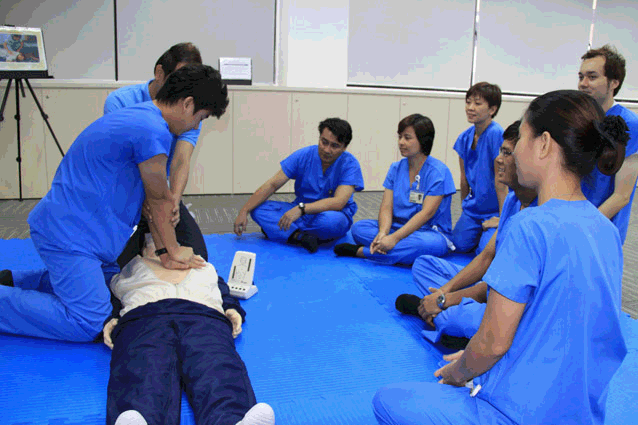AccordionContent1
Course Description
The Basic Cardiac Life Support (BCLS) + Automated External Defibrillator (AED) Certification Course / Heartsaver + AED Certification courses equip participants with the skills for resuscitating collapsed adult and infant* casualties. These are designed to provide a wide variety of healthcare professionals with the ability to recognise several life-threatening emergencies, provide cardiopulmonary resuscitation (CPR), and relieve foreign body airway obstruction in a safe, timely and effective manner. The course is intended for certified or non-certified, licensed or non-licensed healthcare professionals.

Course Objective
Upon completion of this programme, participants will be able to:
- State the importance of the chain of survival
- Perform cardiopulmonary resuscitation (CPR) for adult and infant* casualties
- Illustrate application of the Heimlich maneuver and chest thrust for adults with foreign body airway obstruction
- Perform effective techniques to relieve infant* of foreign body airway obstruction
- Operate AED in a safe and effective manner
Course Outline
The Basic Cardiac Life Support (BCLS) course comprises the following topics:
- Chain of survival
- Anatomy and function of the heart
- Adult CPR
- Adult foreign body airway obstruction
- Infant* CPR
- Adult and infant* recovery position
- Infant* foreign body airway obstruction
- Use of AED
- Practice session
- Theory and practical tests
- Evaluation / feedback
Entry Requirements
The following programme is open to all:
- Medical/Allied health professionals
- Registered nurses
- Enrolled nurses
- Health care assistants/health attendants
- Paramedics
Certificate Awarded
Successful candidates will be awarded a certificate accredited by the Singapore Resuscitation and First Aid Council (SRFAC) with a two-year validity.
Duration
0.5 day for Heartsaver + AED Certification Course, 1 day for BCLS + AED Certification Course
*Educational contents regarding life support for infant is only applicable to the BCLS + AED Certification Course.
AccordionContent2
Course Description
This training programme is designed to equip participants with the knowledge and skills to care for patients with mental health conditions. Topics include common mental conditions and interventions that can help patients with these conditions, management of patients with suicidal and unsafe behaviours. Teaching methods include lectures, discussion and role plays.
Course Objective
Upon completion of this programme, participants will be able to:
- Describe the common mental health conditions
- Utilize various pharmacological and non-pharmacological interventions in the management of mental health conditions
- Engage in the development of therapeutic practitioner patient relationship
- Conduct and document status of mental state examination
- Recognize early signs of relapse
- Describe the monitoring, reporting and management procedures involved for individuals with suicidal behaviours
- Describe the signs of symptoms of emotional arousal, identify impending aggression and apply de-escalation skills during a crisis situation
Course Outline
This programme will equip participants with the knowledge to identify people with mental health conditions and the skills to care for them. Throughout the program, participants will be given opportunities to explore various concerns regarding care of people with mental health conditions and apply various strategies to address these concerns.
Entry Requirements
This programme is designed for frontline nursing and allied health healthcare professionals who are working directly with patients with mental health conditions.
Certificate Awarded
Participants who have successfully achieved all the requirements of this course will be awarded a Certificate of Completion.
Duration
2 days
AccordionContent3
Course Description
This specialised care and response training programme will equip individuals with ethical and effective prevention strategies, physical and psychological self-defence methods, disengagement techniques and standard therapeutic holds to respond individually or as a team in the management of challenging behaviour.

Course Objective
Upon completion of this programme, participants will be able to:
- Describe the theoretical aspects of anger, assessment of patient behaviour and application of de-escalation skills during a crisis intervention.
- Demonstrate the breakaway techniques towards a patient's grab.
- Demonstrate the low-level approaches to challenging patient behaviour.
Course Outline
- The course explores some of the challenges in working with patients who exhibit disturbed, threatening behaviour. It provides staff with adequate knowledge and skills to manage challenging clients with a psychological approach. It also includes a direct hands-on, skills-based component to prepare the learners to break away from any unsafe physical contact from the patient. There will be opportunities to explore complicated issues through case scenarios and discussions. An assessment will be conducted at the end of the course.
Entry Requirements
The following programme is open to all:
- Medical/Allied health professionals
- Registered nurses
- Enrolled nurses
- Health care assistants/health attendants
- Frontline staff working in high-risk healthcare settings
Participants with medical conditions should be exempted from this physical training course
Certificate Awarded
Participants who have successfully achieved all the requirements of this course will be awarded a Certificate of Achievement
Duration
1 to 3 days. The duration of this course varies according to the specialised group/s to be trained. Different packages are provided based on different training needs. The duration of this course also varies based on the specialised group/s to be trained.
AccordionContent4
Course Description
This is a programme combining the Introduction to Mental Health and Care & Response Training to equip participants with the knowledge, skills, plus experience to care for patients with mental health conditions. In addition to classroom training, participants can also be attached to the clinical areas to undergo a 1-day clinical observership programme.
Course Objective
Upon completion of this programme, participants will be able to:
- Describe the common mental health conditions
- Utilize various pharmacological and non-pharmacological interventions in the management of mental health conditions
- Conduct and document status of mental state examination
- Recognize early signs of relapse
- Describe the monitoring, reporting and management procedures involved for individuals with suicidal behaviours
- Describe the signs of symptoms of emotional arousal, identify impending aggression and apply de-escalation skills during a crisis situation
- Apply the knowledge and skills in clinical areas
Course Outline
This program, consisting of 3 modules, will equip participants with the knowledge to identify people with mental health conditions and the skills to care for them. Throughout the program, participants will be given opportunities to explore various concerns regarding care of people with mental health conditions and apply various strategies to address these concerns.
Entry Requirements
This programme is designed for frontline healthcare professionals who are working directly with clients with mental health conditions in the nursing home context.
Certificate Awarded
Participants who have successfully achieved all the requirements of this course will be awarded a Certificate of Completion.
Duration
5 days
AccordionContent5
Course Description
This course is for nurses who manage patients undergoing electroconvulsive therapy (ECT) or repetitive transcranial magnetic stimulation (rTMS), or assist doctors administering ECT / rTMS.
Course Objective
Upon completion of this programme, participants will be able to:
- Be aware of the indications, preparation and procedure for ECT / rTMS
- Perform pre and post ECT/rTMS patient preparation and assessments
- Be proficient in assisting doctors in the procedures of ECT/rTMS
Course Outline
The course comprises of 3 main modular and sequential components to address differing levels of training requirements of various nursing jobs. The modules need to be taken in advancing sequence:
- Module 1: Introductory Psychiatric Nursing NSS module
- Module 2: General Psychiatric Nursing NSS module
- Module 3: (A/B): Advanced Psychiatric Nursing NSS practical module (ECT/rTMS)
Module 1 is conducted via self-paced electronic online learning on Psychiatric Neurostimulation.
Module 2 is conducted through classroom learning. This model will equip the nurses with the ability to perform patient and family education and interpret the nursing rating scales that are used in Psychiatric Neurostimulation.
Module 3 is a practical module. It comprises 3A – ECT and 3B – rTMS. This module is designed for the clinical registered nurse who intends to perform Psychiatric Neurostimulation nursing work independently in their workplace.
Entry Requirements
This programme is designed for psychiatric/mental health nurses who are working directly with clients with mental health conditions.
Certificate Awarded
Participants who have successfully achieved all the requirements of this course will be awarded a Certificate of Completion.
Duration
2 days
AccordionContent6
Course Description
This is a programme developed by the Joanna Briggs Institute, University of Adelaide. It is specifically designed to update and enhance evidence-based practice (EBP) knowledge and processes for conducting, implementing and evaluating evidence-based practice. The course prepares researchers and clinicians to develop, conduct and report robust systematic reviews of different evidence types in order to provide the strongest possible evidence to inform decision making or clinical guidelines in healthcare. The program incorporates both theory and hands on experience so that participants learn how to develop a focused question, search for relevant literature, appraise and synthesize evidence arising from research to inform clinical practice.
Course Objective
Upon completion of this programme, participants will be able to:
- Address nursing problems of concern through scientific methods
- Describe the process of evidence-based practice
- Garner an understanding of the processes for conducting comprehensive systematic review
Course Outline
The course comprises of 3 main modular and sequential components to address differing levels of training requirements.
- Module 1: Introduction to Evidence-based Healthcare and the Systematic Review of Evidence (This is a pre-requisite for module 2 and 3)
- Module 2: The Systematic Review of Quantitative Evidence (This is a pre-requisite for module 3)
- Module 3: The Systematic Review of Evidence Generated by Qualitative Research, Narrative and Text
Entry Requirements
The following programme is open to all:
- Medical/Allied health professionals
- Registered nurses
- Enrolled nurses
- Nursing students
Certificate Awarded
Participants who have successfully achieved all the requirements of this programme will be awarded a certificate issued by the Joanna Briggs Institute, University of Adelaide.
Participants who have successfully achieved the requirements for other programmes relating to research and evidence-based practices that are customized according to the learners’ needs will be awarded a Certificate of Completion issued by the Institute of Mental Health.
Duration
1 to 5 days
The duration of this course varies according to the training request. Different packages are provided based on different training needs.
AccordionContent7
AccordionContent8
AccordionContent9
AccordionContent10
AccordionContent11
AccordionContent12
AccordionContent13
AccordionContent14
AccordionContent15